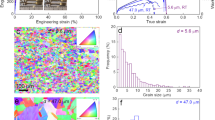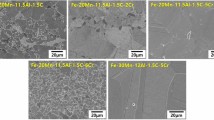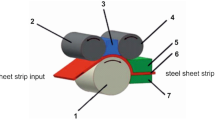Abstract
IT is known that the coercive force of tungsten magnet steel is reduced if the steel is maintained for a period at a temperature of 950–1,000°C. prior to hardening. The steel is then said to be 'spoiled'. In some such samples of tungsten steel the compound WC has been detected, and it has been suggested that the tungsten and carbon remaining in solution are insufficient to promote good hardening1,2. Experiments have been made on an unspoiled steel with the following analysis : W, 5.65 ; C, 0.72 ; Cr, 0.27; Si, 0.24; Mn, 0.3 per cent.
This is a preview of subscription content, access via your institution
Access options
Subscribe to this journal
Receive 51 print issues and online access
$199.00 per year
only $3.90 per issue
Buy this article
- Purchase on SpringerLink
- Instant access to full article PDF
Prices may be subject to local taxes which are calculated during checkout
Similar content being viewed by others
References
Gregg, J. L., "Alloys of Iron and Tungsten", 221–227 (McGraw-Hill, 1934).
Wainwright, C., J. Sci. Instr., 18, 97 (1941).
Sucksmith, W., Proc. Roy. Soc, A, 170, 551 (1939).
Author information
Authors and Affiliations
Rights and permissions
About this article
Cite this article
HOSELITZ, K., McCAIG, M. 'Spoiling' of Tungsten Steel. Nature 159, 710 (1947). https://doi.org/10.1038/159710a0
Issue Date:
DOI: https://doi.org/10.1038/159710a0



